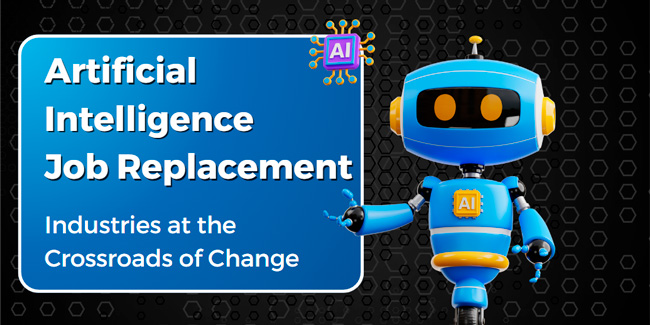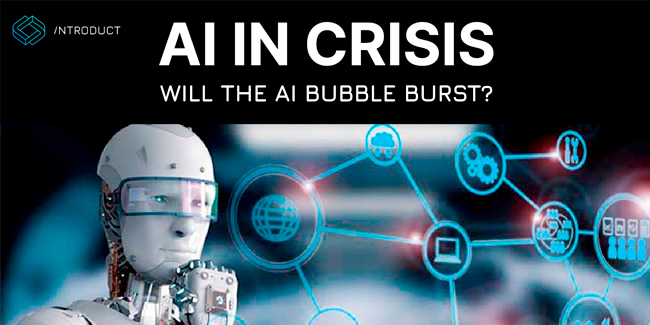

Survival or Obsolescence: Can AI Replace Front-End Developers for Good?


Over the past years, AI has disrupted multiple industries, and front-end development has also been no exception. Being a company proud of delivering tailored software solutions, Introduct understands firsthand how AI is rapidly reshaping tech strategies. This shift is fundamentally changing the landscape for developers and tech professionals alike.
The question most developers, especially starting ones, can ask is: will AI replace front-end developers altogether? The ever-increasing demand for seamless user experiences dictates that developers must constantly learn to stay relevant. Continuous growth is essential to meet the challenges posed by the evolving tech landscape.
Evolution in the Front-End Development Realm
The front end has been changing according to the technologies that happen to emerge. Right from the very early days of simple HTML and CSS to the current frameworks, such as ReactJS and Angular, the developer moved on to learning new tools and methodologies of work. Such exposure did increase interactivity, responsiveness, and user-friendliness for the websites. Developers should be in a constant process of learning something new to stay relevant.
This is where AI fits in as another technological leap to shape this landscape. With AI-powered tools, some automation for code generation, and design suggestions, even testing is starting to emerge for front-end development. While AI is an innovative driver in the field, it can’t fill all the gaps. Human developers’ creative problem-solving skills will still be required in many areas.
Impact of AI on Front-End Technologies
AI will alter the front-end developer’s perspective. AI-driven tools today support code optimization, automate mundane tasks like testing, and can even suggest design elements. For instance, AI can analyze user behavior and suggest design elements to improve engagement. These insights can lead to more intuitive interfaces and improved user satisfaction. AI-powered design tools like Wix ADI or auto-layout features in Sketch already support this by creating layouts and designs in seconds and saving hours of time and effort for developers.
However, it’s important to note that while AI helps optimize design and coding processes, it can’t replace human creativity. The role of developers remains crucial in crafting unique, innovative solutions. The developers bring along the intrinsic insight required for user-oriented design and adapt the model for specific project objectives. As Introduct has experienced with our customers, while AI can help speed up workflows using productivity tools, replication of the human touch remains imperative to deliver outstanding experiences.
Will AI Replace Front-End Developers?
It is perfectly fine to worry that AI would eliminate the need for a front-end developer, but this isn’t likely. As much as AI can automate some tasks, it does not have the ability for adaptability, problem-solving, or creativity that is particularly needed in a complex project. These AI models, like GPT-4, can write snippets and templates. However, most are bound to need some human oversight concerning accuracy, security, and general usability.
AI also tends to fail with very large, unique projects that require personalization and a deep sense of the user’s needs. Skilled front-end developers will continue to thrive in these domains. Developers are significant in making websites functional and meeting the expectations of both users and businesses.
The Future: Collaboration of AI and Developers
AI should not be seen as a threat but rather as an advanced tool that can enhance the productivity of a front-end developer. It is going to take care of mundane or repetitive tasks that are going to require developers’ attention and let them move on to more complex or creative works. For example, AI does the prototyping while leaving refinement and perfecting for the developers.
As the demand for more sophisticated sites and applications increases, so does the need for companies like Introduct that rely on skilled developers who can realize the capabilities of AI. The point, here, is not to fear AI but to integrate it within the development process to bring about synergy between human creativity and machine efficiency.
A Collaborative Future
The future is bright for front-end development. AI will support this area, not take it over totally. With the combination of AI tools and human expertise, better and more innovative digital solutions can be created. The developer who feels that AI is his collaborator, not his competitor, will be more prolific and will ensure outstanding results. In the fast-changing field, continuous learning and adaptation remain important-and there the real strength of front-end developers will come into play.
More Articles

AI Job Shift: Industries Job Market Transformation AI Job Shift: Industries Job Market Transformation
The topic of AI job replacement is widely discussed nowadays, as people worldwide are worried about possible jobs loss. Moreover, the rise of artificial intelligence has significantly changed many industries, shaking up job markets and how money flows. To find the perspective and ways to stay afloat, it becomes increasingly important to understand AI’s impact […]

AI in Crisis: Will the AI Bubble Burst? AI in Crisis: Will the AI Bubble Burst?
The development of artificial intelligence has brought many innovations to our world and many areas of people's lives. But is this really the case? Today, there are many controversial questions about AI. Recently, many potentially unstable moments have been discovered in relation to its work in different industries. Inefficient financial management, exaggerated expectations of AI, and possible options for further development are some of the key issues. Let's take a look at the development of artificial intelligence in recent years. The examples will allow us to see if the bubble is really bursting.
